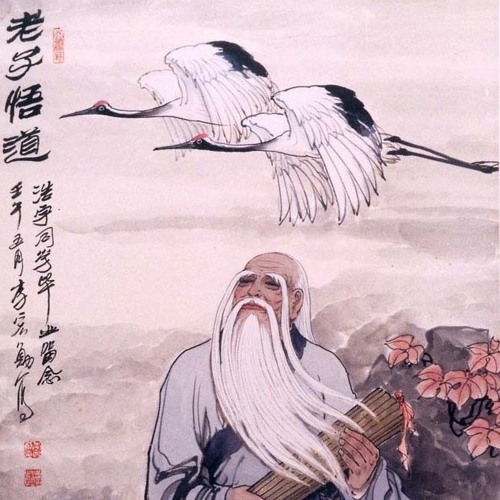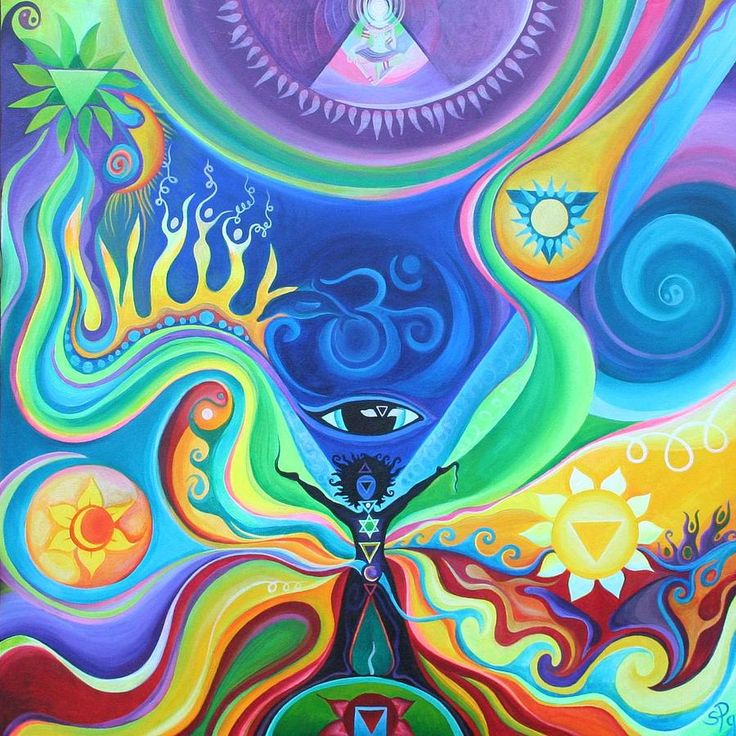Blog
Harry Belafonte (born Harold George Bellanfanti Jr.; March 1, 1927 – April 25, 2023) was an American singer, actor, and civil rights activist, who popularized calypso music with international audiences in the 1950s and 1960s. Belafonte’s career breakthrough album Calypso (1956) was the first million-selling LP by a single artist.
Belafonte was best known for his recordings of “Day-O (The Banana Boat Song)“, “Jump in the Line (Shake, Senora)“, “Jamaica Farewell“, and “Mary’s Boy Child“. He recorded and performed in many genres, including blues, folk, gospel, show tunes, and American standards. He also starred in films such as Carmen Jones (1954), Island in the Sun (1957), Odds Against Tomorrow (1959), Buck and the Preacher(1972), and Uptown Saturday Night (1974). He made his final feature film appearance in Spike Lee‘s BlacKkKlansman (2018).
Belafonte considered the actor, singer, and activist Paul Robeson to be a mentor. Belafonte was also a close confidant of Martin Luther King Jr. during the civil rights movement of the 1950s and 1960s and acted as the American Civil Liberties Union celebrity ambassador for juvenile justice issues. He was also a vocal critic of the policies of the George W. Bush and Donald Trump administrations.
Belafonte won three Grammy Awards, including a Grammy Lifetime Achievement Award, an Emmy Award, and a Tony Award. In 1989, he received the Kennedy Center Honors. He was awarded the National Medal of Arts in 1994. In 2014, he received the Jean Hersholt Humanitarian Award at the academy’s 6th Annual Governors Awards and in 2022 was inducted into the Rock and Roll Hall of Fame in the Early Influence category. He is one of the few performers to have received an Emmy, Grammy, Oscar, and Tony (EGOT), although he won the Oscar in a non-competitive category.
more...Frédéric François Chopin (born Fryderyk Franciszek Chopin; 1 March 1810 – 17 October 1849) was a Polish composer and virtuoso pianist of the Romantic period, who wrote primarily for solo piano. He has maintained worldwide renown as a leading musician of his era, one whose “poetic genius was based on a professional technique that was without equal in his generation”.
Chopin was born in Żelazowa Wola and grew up in Warsaw, which in 1815 became part of Congress Poland. A child prodigy, he completed his musical education and composed his earlier works in Warsaw before leaving Poland at the age of 20, less than a month before the outbreak of the November 1830 Uprising. At 21, he settled in Paris. Thereafter he gave only 30 public performances, preferring the more intimate atmosphere of the salon. He supported himself by selling his compositions and by giving piano lessons, for which he was in high demand. Chopin formed a friendship with Franz Liszt and was admired by many of his musical contemporaries, including Robert Schumann. After a failed engagement to Maria Wodzińska from 1836 to 1837, he maintained an often troubled relationship with the French writer Aurore Dupin (known by her pen name George Sand). A brief and unhappy visit to Mallorca with Sand in 1838–39 would prove one of his most productive periods of composition. In his final years, he was supported financially by his admirer Jane Stirling. For most of his life, Chopin was in poor health. He died in Paris in 1849 at the age of 39.
All of Chopin’s compositions feature the piano. Most are for solo piano, though he also wrote two piano concertos, some chamber music, and 19 songs set to Polish lyrics. His piano pieces are technically demanding and expanded the limits of the instrument; his own performances were noted for their nuance and sensitivity. Chopin’s major piano works include mazurkas, waltzes, nocturnes, polonaises, the instrumental ballade (which Chopin created as an instrumental genre), études, impromptus, scherzi, preludes, and sonatas, some published only posthumously. Among the influences on his style of composition were Polish folk music, the classical tradition of Mozart and Schubert, and the atmosphere of the Paris salons, of which he was a frequent guest. His innovations in style, harmony, and musical form, and his association of music with nationalism, were influential throughout and after the late Romanticperiod.
Chopin’s music, his status as one of music’s earliest celebrities, his indirect association with political insurrection, his high-profile love life, and his early death have made him a leading symbol of the Romantic era. His works remain popular, and he has been the subject of numerous films and biographies of varying historical fidelity. Among his many memorials is the Fryderyk Chopin Institute, which was created by the Parliament of Poland to research and promote his life and works. It hosts the International Chopin Piano Competition, a prestigious competition devoted entirely to his works.
more...Peret was a Spanish Romani singer, guitar player and composer of Catalan rumba.
Derived from the flamenco rumba, the Catalan rumba was born in the 1950s under the impulse of the gypsy community of Barcelona, especially in the popular district of Raval, Gracia and Hostafrancs. It’s a mixture of flamenco rumba, Cuban son and mambo, with rock & roll.
more...Messier 81 (also known as NGC 3031 or Bode’s Galaxy) is a grand design spiral galaxy about 12 million light-years away in the constellation Ursa Major. It has a D25 isophotal diameter of 29.44 kiloparsecs (96,000 light-years). Because of its relative proximity to the Milky Way galaxy, large size, and active galactic nucleus (which harbors a 70 million M☉ supermassive black hole), Messier 81 has been studied extensively by professional astronomers. The galaxy’s large size and relatively high brightness also makes it a popular target for amateur astronomers. In late February 2022, astronomers reported that M81 may be the source of FRB 20200120E, a repeating fast radio burst.
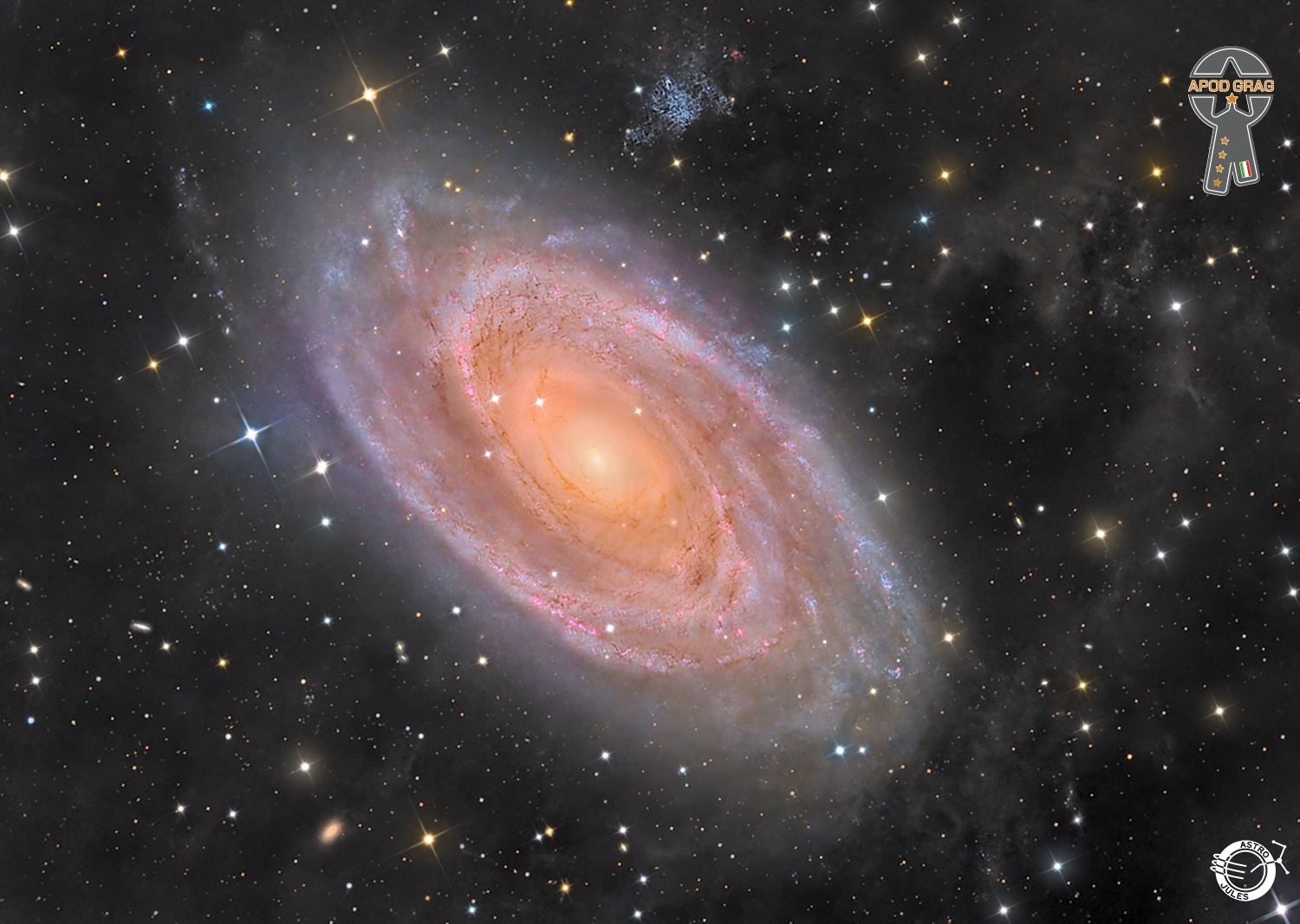
Khaled Hadj Ibrahim born 29 February 1960), better known by his mononym Khaled (Arabic: خالد), is an Algerian raï singer, musician and songwriter. He began recording in his early teens under the name Cheb Khaled (شاب خالد, Arabic for “Young” Khaled, with “Cheb” as a common title for male raï singers).
Khaled is one of the most important musicians in the history of Raï music in his native Algeria and is one the world’s best-known Arab singers. To date, Khaled has sold over 80.5 million albums (10 diamond, platinum, and gold) worldwide, making him one of the bestselling Arabic-language singers in history.Among his most famous songs are “Aïcha“, “Didi“, “El Arbi”, “Abdel Kader“, “La Poupée qui fait non“, “Wahran Wahran”, “Bakhta”, “C’est la vie“, and “Alech Taadi”.
He holds the Guinness World Record for best-selling artist of raï music.
more...Richie Cole (February 29, 1948 – May 2, 2020) was an American jazz saxophonist, composer, and arranger.
Cole was born in Trenton, New Jersey. He began to play alto saxophone when he was ten years old, encouraged by his father, who owned a jazz club in New Jersey. He was a graduate of Ewing High School, in Ewing Township, New Jersey. Cole won a scholarship from DownBeat magazine to attend the Berklee School of Music in Boston.
In 1969, he joined drummer Buddy Rich‘s Big Band. After working with Lionel Hampton‘s Big Band and Doc Severinsen‘s Big Band, he formed his own quintet and toured worldwide, developing his own “alto madness” bebop style in the 1970s and early 1980s. He formed the Alto Madness Orchestra in the 1990s.
more...ames Francis Dorsey (February 29, 1904 – June 12, 1957) was an American jazz clarinetist, saxophonist, composer and big band leader. He recorded and composed the jazz and pop standards “I’m Glad There Is You (In This World of Ordinary People)” and “It’s The Dreamer In Me“. His other major recordings were “Tailspin“, “John Silver“, “So Many Times“, “Amapola“, “Brazil (Aquarela do Brasil)”, “Pennies from Heaven” with Bing Crosby, Louis Armstrong, and Frances Langford, “Grand Central Getaway”, and “So Rare“. He played clarinet on the seminal jazz standards “Singin’ the Blues” in 1927 and the original 1930 recording of “Georgia on My Mind“, which were inducted into the Grammy Hall of Fame. Jimmy Dorsey was born in Shenandoah, Pennsylvania, United States, the first son of Theresa Langton Dorsey and Thomas Francis Dorsey.
more...NGC 3139 is a Lenticular Galaxy in the Hydra constellation. NGC 3139 is situated close to the celestial equator and, as such, it is at least partly visible from both hemispheres in certain times of the year.
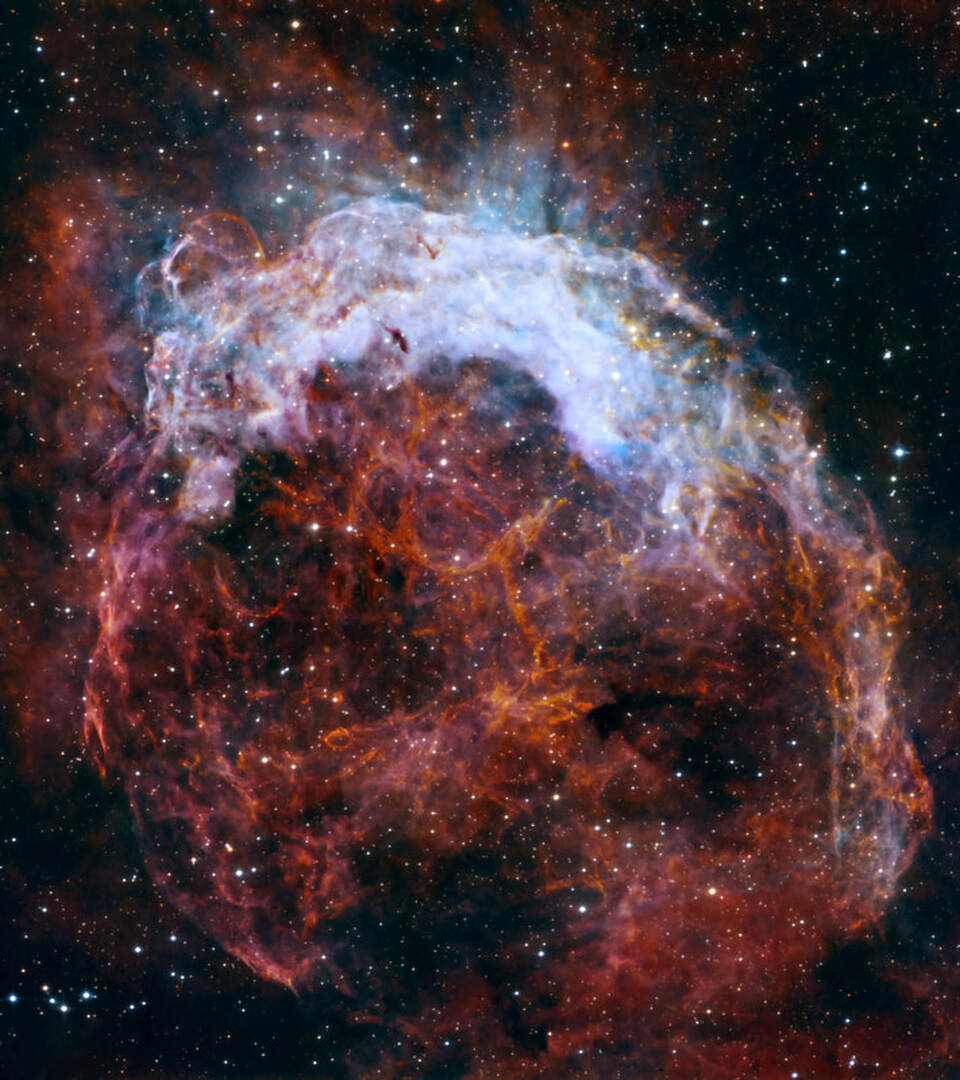
Charles Gayle (February 28, 1939 – September 7, 2023) was an American free jazz musician. Initially known as a saxophonist who came to prominence in the 1990s after decades of obscurity, Gayle also performed as pianist, bass clarinetist, bassist, and percussionist.
Charles Gayle was born on February 28, 1939, in Buffalo, New York.
more...Lewis Brian Hopkin Jones (28 February 1942 – 3 July 1969) was an English musician, songwriter and record producer. He was the founder, rhythm/lead guitarist, and original leader of the Rolling Stones. Initially a guitarist, he went on to sing backing vocals and played a wide variety of instruments on Rolling Stones recordings and in concerts.
After he founded the Rolling Stones as a British blues outfit in 1962 and gave the band its name, Jones’s fellow band members Keith Richards and Mick Jagger began to take over the band’s musical direction, especially after they became a successful songwriting team.
When Jones developed alcohol and drug problems, his performance in the studio became increasingly unreliable, leading to a diminished role within the band he had founded. In June 1969, the Rolling Stones dismissed Jones; guitarist Mick Taylor took his place in the group. Less than a month later, Jones died by drowning in the swimming pool at his home at Cotchford Farm, East Sussex. His death was referenced in songs by many other pop bands, and Pete Townshend and Jim Morrison wrote poems about it. In 1989, he was inducted into the Rock and Roll Hall of Fame as a member of the Rolling Stones.
more...John Aloysius Fahey (/ˈfeɪhi/ FAY-hee; February 28, 1939 – February 22, 2001 Washington DC) was an American fingerstyle guitarist and composer who played the steel-string acoustic guitar as a solo instrument. His style has been enormously influential and has been described as the foundation of the genre of American primitive guitar, a term borrowed from painting and referring mainly to the self-taught nature of the music and its minimalist style. Fahey borrowed from the folk and blues traditions in American roots music, having compiled many forgotten early recordings in these genres. He would later incorporate 20th-century classical, Portuguese, Brazilian, and Indian influences into his work.
Fahey spent many of his later years in poverty and poor health, but enjoyed a minor career resurgence in the late 1990s, with a turn towards the avant-garde. He also created a series of abstract paintings in his final years. Fahey died in 2001 from complications from heart surgery. In 2003, he was ranked 35th on Rolling Stone magazine’s “100 Greatest Guitarists of All Time” list. In 2023, Rolling Stone ranked Fahey as 40th greatest guitarist of all time.
more...William Correa (February 28, 1934 – September 15, 1983), better known by his stage name Willie Bobo, was an American Latin jazz percussionist of Puerto Rican descent. Bobo rejected the stereotypical expectations of Latino music and was noted for combining elements of jazz, Latin and rhythm and bluesmusic.
Born William Correa to a Puerto Rican family, Bobo grew up in Spanish Harlem, New York City, United States. His father played the cuatro, a ten stringed guitar-like instrument. As a teenager, Bobo taught himself the bongos and later the congas, timbales and drums. In 1947, Bobo started working as a band boy for Machito in order to gain entrance to the band’s concerts, sometimes filling in on percussion.
At age 12, he began his professional career as a dancer and two years later made his recording debut as a bongo player.
more...Supernova remnant Simeis 147. Also cataloged as Sharpless 2-240, the filamentary nebula goes by the popular nickname the Spaghetti Nebula. Seen toward the boundary of the constellations of the Bull (Taurus) and the Charioteer (Auriga), the impressive gas structure covers nearly 3 degrees on the sky, equivalent to 6 full moons. That’s about 150 light-years at the stellar debris cloud’s estimated distance of 3,000 light-years. This composite image includes data taken through narrow-band filters isolating emission from hydrogen (red) and oxygen (blue) glowing gas. The supernova remnant has an estimated age of about 40,000 years, meaning light from this massive stellar explosion first reached the Earth when woolly mammoths roamed free. Besides the expanding remnant, this cosmic catastrophe left behind a pulsar: a spinning neutron starthat is the remnant of the original star’s core.
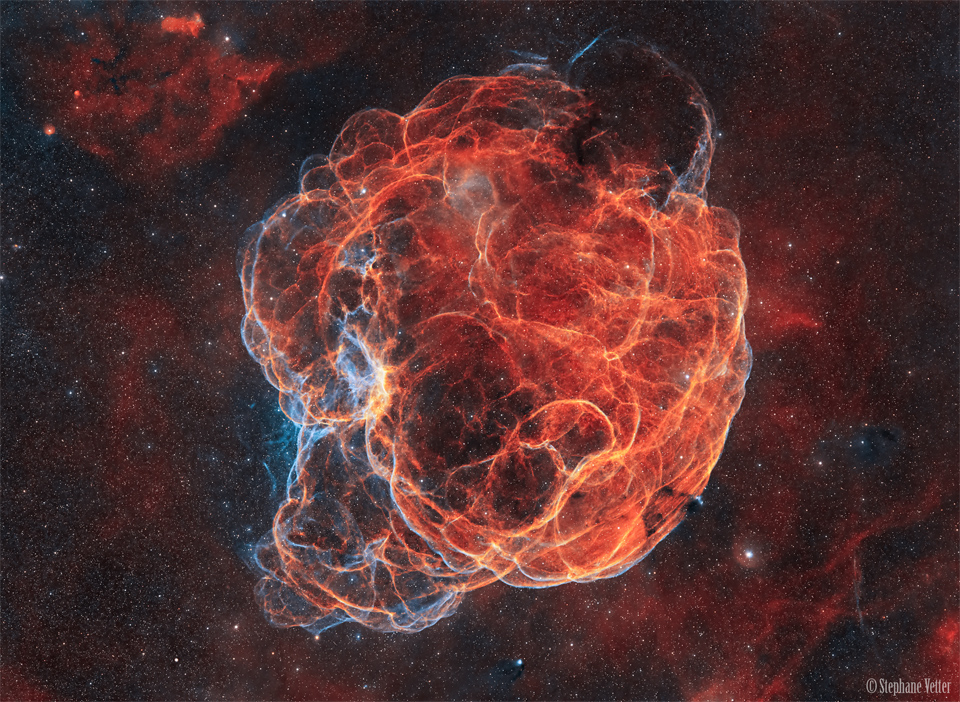
More Posts
- Joe Chambers Day
- Clifton Chenier Day
- Johnny Smith Day
- World Music with Haig Yazdjian
- Daily Roots with Peter Tosh
- Your Community Band 6-24-18 2pm
- The Cosmos with NGC 7098
- Jeff Beck Day
- Lester Williams Day
- Terry Riley Day
- World Music with George Abdo
- Daily Roots with Damian Marley and Nas
- Geoffrey Oryema Ugandan musician Passes
- The Cosmos with IC 2631
- George Russell Day
- Milt Hinton Day
- World Music with Mustapha Tettey Addy
- Daily Roots with Turbulence
- The Cosmos with NGC 4565
- Kris Kristofferson Day
